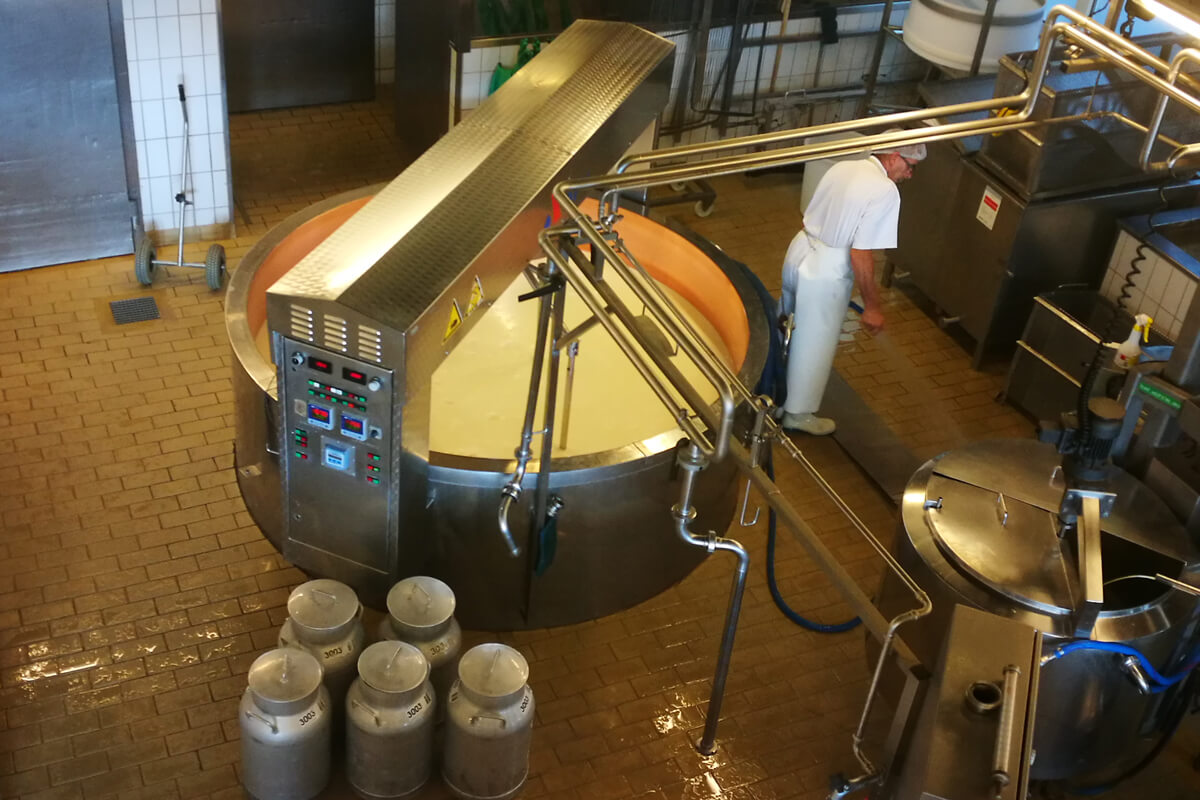Recognizing the Science Behind Cheese Manufacturing: From Milk Option to End Product
The elaborate procedure of cheese manufacturing starts with the careful choice of milk, a selection that greatly affects the final product's flavor and structure. Recognizing the crucial duty of microorganisms in fermentation reveals exactly how these bacteria change lactose right into lactic acid, an essential ingredient in developing the cheese's personality. cheese store melbourne.
Milk Selection Refine
The selection of milk is a vital step in the cheese production process, as it straight affects the taste, appearance, and top quality of the end product. Different aspects have to be thought about during this choice, consisting of the resource of the milk, the type of the pets, and their diet regimen. Cow's milk, goat's milk, and sheep's milk each have unique properties that add to the distinct qualities of different cheese selections.

Furthermore, the dietary web content of the milk, affected by the pet's diet, can alter celebrity's final features. Top notch milk, sourced from healthy pets, guarantees a premium cheese item, stressing the value of rigorous top quality control measures in the milk selection process. Hence, cautious factor to consider in milk choice is crucial for effective cheese manufacturing.

Role of Microorganisms in Fermentation
Complying with the mindful choice of milk, the fermentation process plays a critical role in cheese manufacturing, where microorganisms are introduced to change the milk into cheese. The primary function of these germs is to convert lactose, the sugar present in milk, right into lactic acid. This acidification not only modifies the pH of the milk however likewise plays an important duty in flavor growth, texture, and conservation of the end product.
Lactic acid germs (LABORATORY), such as Lactococcus and Streptococcus varieties, are generally utilized in cheese manufacturing as a result of their capability to flourish in milk and their payment to the fermentation process. The metabolic activities of these germs cause the production of different metabolites, including flavor substances and antimicrobial substances, which inhibit spoilage organisms and pathogenic microorganisms, thereby improving cheese safety and security.
Furthermore, the fermentation procedure affects the total qualities of celebrity, including its fragrance, preference, and texture. Different stress of microorganisms can impart distinctive flavors and contribute to the special profiles of numerous cheese types. Thus, the choice of microbial societies is an important action in accomplishing the preferred cheese top quality and uniformity.
Coagulation and Curd Development
In celebrity manufacturing process, coagulation marks a crucial shift from liquid milk to solid curds. This transformation is mostly generated by the enhancement of rennet, an enzyme that acts upon casein, the primary protein in milk. When rennet is introduced, it promotes the gathering of casein particles, bring about the development of a gel-like structure. This process is typically matched by the acidic environment produced by lactic acid germs, which even more aids in coagulation by decreasing the pH of the milk.
The resulting curds are formed as the fluid whey begins to divide. Aspects such as temperature level, the quantity of rennet used, and the moment permitted coagulation are vital in identifying the resource structure and top quality of the curds. For instance, greater temperatures and longer coagulation times generally generate firmer curds, ideal for more challenging cheeses. cheese for sale online.
As soon as curds are developed, they are reduced into smaller items, allowing whey to get away extra effectively. This action is important, as it affects the moisture material and total characteristics of the last cheese product. Correct management of coagulation and curd formation is essential for achieving certain cheese styles and wanted taste profiles.
Aging and Flavor Advancement
After the curd has actually been formed and whey has been drained, the following phase in cheese manufacturing is aging, likewise recognized as maturation. This vital process dramatically affects the cheese's last flavor, texture, and scent. During aging, numerous biochemical and microbiological changes happen, affecting the general sensory account.
The aging setting, consisting of temperature level and moisture, plays an essential role in flavor advancement. Enzymes and germs present in the cheese assist in the malfunction of healthy proteins and fats right into smaller sized particles, bring about the formation of amino acids, fats, and unstable compounds. These transformations add to the complexity of flavor and scent, with distinct profiles emerging based on the particular cheese variety.
Furthermore, the period of aging is crucial; much shorter aging durations generally yield milder flavors, while longer growth lead to even more robust and nuanced profiles. Factors such as the milk webpage resource, cheese kind, and certain aging methods additionally boost the variety of flavors produced. Inevitably, aging is a fragile balance of time, environmental problems, and microbial task, culminating in the unique characteristics that specify each cheese range.
Quality Assurance in Cheese Production
Guaranteeing high requirements throughout the cheese manufacturing process is important for delivering a top quality item that fulfills consumer assumptions - cheese for sale online. Quality assurance (QC) encompasses numerous stages, beginning with raw milk choice to the last aging process. Each stage needs meticulous focus to detail to protect against contamination and make certain uniformity
Throughout milk choice, manufacturers need to assess aspects such as fat content, pH degrees, and microbial quality. Routine testing for somatic cell counts and microbial tons is essential to ensure the milk's viability for cheese making. In the manufacturing phase, QC procedures include monitoring the temperature, acidity, and rennet task, which considerably affect texture and flavor.
As cheese grows, continuous sensory analyses and laboratory evaluations are conducted to evaluate taste growth, texture, and general top quality. Any deviations from established criteria require rehabilitative activities to keep item integrity.
Additionally, documents and traceability are important elements of reliable quality control, allowing manufacturers to track celebrity from ranch to consumer. By executing robust QC procedures, cheese makers can not just enhance product quality however likewise develop consumer depend on, guaranteeing their location in an open market.

Final Thought
Finally, the Visit This Link science of cheese manufacturing encompasses numerous critical points, each significantly influencing the end product. The mindful choice of milk, the vital role of microorganisms in fermentation, the makeover of liquid milk right into curds via coagulation, and the aging process jointly add to the development of special tastes and structures. Stringent high quality control gauges guarantee that each cheese selection meets well-known criteria, consequently enhancing consumer contentment and maintaining the stability of the cheese-making practice.